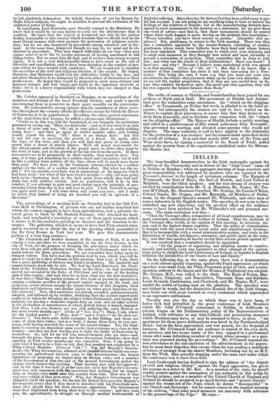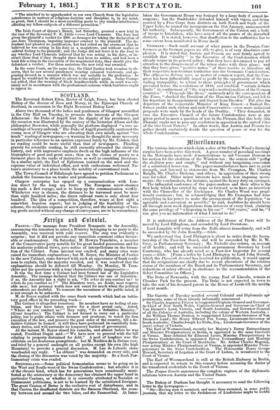IRELAND. .
The long-heralded demonstration in the Irish metropolis against the abolition of the Viceroyalty and in favour of the "Irish Court" came off in Dublin on Monday ; when an aggregate meeting of large numbers and great respectability was addressed by speakers who are reported in the Freeman's Journal to the length of seventeen columns. The Marquis of Westmeath, the Earl of Mayo the Earl of Howth, and Lord Talbot de Malahide, were the titled speakers ; and the vast stream of oratory was swelled by contributions from Mr. G. A. Hamilton, Mr. Napier, Mr. Tor- rens M'Cullagh, Mr. Sharman Crawford, Mr. Grattan, Sir Lucius O'Brien, Colonel Dunne, Mr. Grogan, and Mr. Reynolds, all Members of Parlia- ment, by the eloquent Queen's counsel Mr. Whiteside, and other men of names unknown to the English reader. The speeches do not seem to have embodied any new objections' and the greatest effect on the audience seems to have been produced by Mr. Whiteside's wit and personal sar- casm. The main resolution was this— "That the Viceregal office, irrespective of all local considerations, may be made eminently condneive to the welfare of Ireland. That the abolition of the Viceregal office would, in the opinion of this meeting, be injurious, un- just, and in the highest degree impolitic. That the policy of centralization is fraught with the worst evils to social order and constitutional freedom ; that it is incompatible with a sound administrative system, and tends to the diminution of wealth, intelligence, enterprise, and public spirit in the coun- try; and that this meeting do hereby record their solemn protest against it."
It was resolved, that a committee should be appointed, . . . .." for thp purpose of organizing and adopting means to constitu- tionally and lawfully resist any legislative or other attempt of the central- izing policy to aboljth the Lord-Lieutenancy of Ireland, or transfer to English tribunals the jurisdiction of our Courts of Law and Equity."
On the following day, in the same place, there was a demonstration on a scale almost equally imposing, against the Papal aggression; at which speeches were made from the Ultra-Protestant point of vietv, and a corre- sponding address to the Queen and the Houses of Parliament was adopted. Mr. Grogan, M.,,was called to the chair. The Earls of Roden, Ran- dom Mayo, Clancarty, and Enniskillen, Viscounts Naas and Suirdale, Lords Bernard,. Castlemaine, and Clonbrock, and Mr. Napier, M.P., were amidst the crowd of leading men on the platform. The speeches were not violent in words, but the distinctive Kentish fire of the Irish Orange- men broke out with great warmth at every sentiment which approached to an aggressive enthusiasm.
Tuesday was also the day on which there was to have been, if better luck had permitted it, the great conference of Irish Members which Mr. John O'Connell summoned to Dublin, to deliberate in solemn league on the Parliamentary policy of the Representatives of Ireland, with reference to any Anti-Catholic and persecuting measures which Ministers may have, or may be assumed to have, in store. . "An apartment for theselgrave deliberations was hired in the Northumberland Hotel; but as the hour approached, and was passed, for the despatch of business, Mr. O'Uonnell found his audience to consist of his own clerk, an attorney, and two lesser limbs of the law, engaged in a professienal cruise after some defaulting member of society whose presence as a spec- tator was expected during the proceedings." Mr. O'Connell imputed the non-attendance to the non-insertion of his advertisement in the papers : but he must have forgotten that excuse when he was reading a multitude of letters of apology from the absent Members, including one by an-M.P. from the Wed, then actually stopping wider the same roof under which
the conference was to have been hold. , •
Lord Castlereagh, having declined to sign the address of "the friends of civil and religious liberty" against the Papal aggression, has given his reasons in a letter, to Mr. Ear. AB a member of the state, he shonld readily protest against the assumption of any authority in this realm by a foreign prince.;., and-as a member of the United Church of England and Ireland he should be prepared to go much further, and " protest directly" against the recent act of the Pope, which he deems "disrespectful" to our Church and Sovereign : but he cannot concur in the implied meaning of the address, "that some penal measures are necessary with reference to the proceedings of the Pope." He says- 1, The mischief to be apprehended to our own Church from the legislative interference in matters of religious doctrine and discipline is, in my mind, so great, that I should be a most unwilling party to any similar interference affecting my fellow-subjects of a different persuasion."
The Irish Court of Queen's Bench, last Saturday, granted a new trial in the case of the Reverend T. K. Little versus Lord Clements. The Jury had given the plaintiff a verdict for 300/. as damages for taking the declaration of one Jane Thompson, imputing improper conduct to the plaintiff. The de- fendant had pleaded no justification, but had relied on the averment that he believed he was acting in his duty as a magistrate, and without malice or unkind feeling to the plaintiff; and the Judge did not leave it to the Jury to say whether Lord Clements believed that he was acting in his duty, or in- struct them that if they thought there had been no malice, and had been a bon& fide acting in the execution of the magisterial duty, they should give the defendant a verdict. For these omissions the new trial was awarded.
In the same Court, on the same day, the Chief Justice took occasion to ob- serve, that he saw several gentlemen wearing coloured waistcoats, and ap- pearing dressed in a manner which was not suitable to the profession : he hoped he would not be obliged to advert to the subject again. Judge Cramp- ton added, that the wearing of black handkerchiefs while in court was cer- tainly not in accordance with the professional costume which barristers ought to appear in.



























 Previous page
Previous page